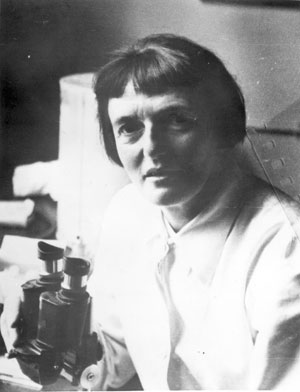Charlotte Auerbach 1899-1994
Discovered the connection between mustard gas and gene mutation
Charlotte was born and raised in Germany. She studied Biology and Chemistry there and decided to become a school teacher. Hitler’s anti-Semitic policies forced her from her post but encouraged by her mother and friends of her father, she obtained a post at Edinburgh University Institute of Animal Genetics in 1933. She obtained her PhD in 1935 and stayed on as a researcher.
In 1938 Charlotte learnt techniques for studying gene mutation in fruit flies (these are much used in genetics experiments) under the American geneticist H.J. Muller who was in Edinburgh at the time. In 1940 it was suggested that she should study the mutagenic effects of mustard gas, especially its effects on the eye. Her work resulted in the discovery in 1941 that gene mutations can be artificially induced by treatment of fruit flies with mustard gas. Throughout the war the work was kept secret but accolades came afterwards including receiving the Keith Prize of the Royal Society of Edinburgh in 1948.
Charlotte stayed at the institute for the rest of her life, gaining a professorship at home and honours from around the world – including Germany. She was invited to take a senior position there and refused it saying: I would rather be a lab. girl in Scotland than a professor in Germany.
Her other interests were music, support for the Campaign for Nuclear Disarmament (CND), and opposition of apartheid. She loved children (she adopted two) and wrote a book of fairy tales, Adventures of Rosalund, under the pseudonym of Charlotte Austen.
Tiana Sidey
Sources:
Beale, Geoffrey. Obituary: Professor Charlotte Auerbach. The Independent 21 st March 1994
Beale, Geoffrey, Charlotte Auerbach 1899-1994. Jewish Women’s Archive. jwa.org/encyclopedia/article/auerbach-charlotte
Kilbey, B J. Charlotte Auerbach 1899-1994 (on-line pdf)

